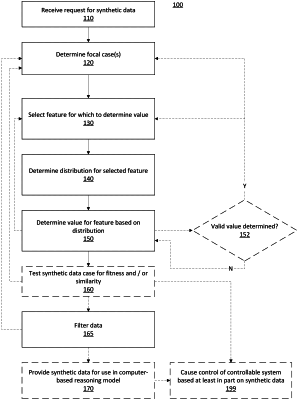| CPC G06N 20/00 (2019.01) [G06F 16/2282 (2019.01); G06N 5/04 (2013.01)] | 23 Claims |

|
1. A method comprising:
receiving a request for generation of synthetic data based on a set of training data cases;
determining one or more conditions for the synthetic data;
for each synthetic data case in the synthetic data,
for each undetermined feature in the synthetic data case,
determining one or more focal training data cases from among the set of training data cases based at least in part on the one or more conditions and any already-determined value for features in the synthetic data case;
determining a value for the undetermined feature in the synthetic data case based at least in part on the focal training data cases;
using the value for the undetermined feature in the synthetic data case;
continuing to determine undetermined features until there are no more undetermined features;
providing a computer-based reasoning model for control of a controllable system, wherein the computer-based reasoning model that was determined at least in part based on the synthetic data cases in the synthetic data;
wherein the method is performed by one or more computing devices.
|